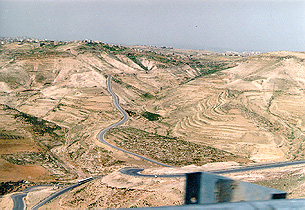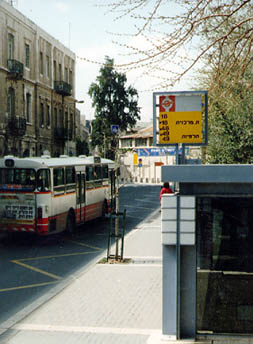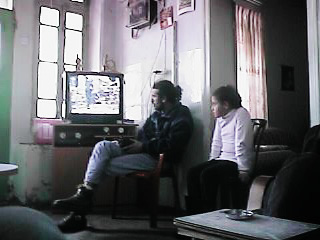
Off to Jebal Abu Ghnaim for the second time with Kifah, again in Saleem's car. The Wadi An-Nar road's twists and potholes (left) didn't claim any tires from us and we arrived safely in Beit Sahour, just as Lyse Doucet reported on the BBC World Service news that there was to be a demonstration at the mountain in the afternoon. We had already heard about this and had come once again to photograph and observe.
There was a new passenger along with the three of us - Hanan Elmasu - who works for Birzeit's Continuing Education Department and Baraka, the Palestinian NGO Internet service provider. Hanan compiled the overviews and did most of the image scanning for Birzeit's website about the clashes last September. Hanan arrived in Palestine during Christmas 1994, a few months after myself and has become a good friend.

The reception of the BBC news was terrible. "Did it say there was just a bombing in Tel Aviv?" I asked. "No. It couldn't be," everyone said. It was unthinkable after such a long break in these attacks that we would be once again in a situation where they started again. There are enough roadside memorials in Israel/Palestine like the ones that appeared after last year's attacks.
Bus bombings are the shotgun in the arsenal of the powerless, claiming victims from a random spectrum of people; Israelis, Jews visiting their families here, Palestinians working inside Israel, Israeli Arabs and tourists. Hanan told us a chilling story last year about a Palestinian neighbor in her hometown village of Beit Jala, located between Beit Sahour and Bethlehem.
He had lost his wife in the second bombing of Bus No. 18 last March, in 1996 (pictured right, a week after the second attack). She had worked as a nurse in West Jerusalem and used to travel there every day via the Israeli bus service. The first Sunday the bus was bombed, his wife had quickly rung home to let the family know she was safe. They had been worried as they knew she always took the No. 18 around the time of the bombing.
The second Sunday, when news that the same bus had been hit at the same time, they heard nothing from her. By the evening, many of the extended family had gathered in the husbandís house, waiting for the inevitable news. It came in a way that no one could have expected. Two Israeli soldiers came to the door and asked the husband to step outside with them into the garden. Then, one pulled his wifeís head out of a bag and asked him to identify it.
There is absolutely no question that Jewish relatives of a bus bombing victim would have been treated like this. I cannot imagine what was going through the soldiers' minds. It is not impossible that the nurse had spent the previous Sunday treating the soldiers' injured relatives or friends after the first bus bombing.
Sometimes, this conflict reveals a deep, deep sickness in the human soul that is very painful to look at.

Driving through Beit Sahour, we headed towards the house of George Rishmawi, one half of "The Two Georges" mentioned in the diary entry from our last visit to the mountain. Both Georges have been spending hours over the last few weeks learning HTML and scanning tricks. As Beit Sahour residents, they appreciated the Abu Ghnaim Diary entries I wrote and wanted to put together some of their own stuff about it all. It's always fun seeing people getting into this new form of communication - an electronic expansion of societal networks - actual villages become virtual towns, actual towns become virtual cities, and actual cities become virtual countries - while in reality, options around them are shrinking.
As we met George at his house, we found out pretty soon that there had indeed been a bombing, and sat down to watch the TV transmitting live images from the scene. A bomb had gone off in a restaurant and had left in its wake stunned people, covered with blood, and aimlessly walking around in shock. Medics, news reporters, policemen and passers-by all struggled to make sense of the carnage.
News of events like these is not greeted by Palestinians with the delight that many Israelis assume. A few - of course - have dehumanised the Israelis to the point that they do express support for bombings in polls. Some have more personal reasons for their support. Someone from Hamas once explained to me, "Imagine a mother who has had her child killed by Israeli soldiers. When she hears of a bus bombing, she can at least know that an Israeli mother is also experiencing her pain."

This is only a small part of the story, as most Palestinians seem to be shocked and very critical of such activities. "We don't want to become like them," said one friend, "When one of us blows people up, he has become one of them." Hidden in this statement is an implicit reference to the seemingly endless Israeli violations of Palestinian human rights which, for those of us who believe that violence operates in a cycle, forces a consideration that these acts have not come out of a vacuum.
When a lone Israeli kills Palestinians with his army-issued rifle, he is described by Israeli government as "mad". If a Palestinian does the same thing, he is a "terrorist". This equation denies responsibility for a governmental system where legalised murder of Palestinian demonstrators in non-life threatening situations is part of your national service. A system that promotes the dehumanisation and racism that gives a green light for the "lone" Israeliís next step.
One middle-aged Palestinian man, owner of a souvenir shop in the Old City of Jerusalem, whose son was killed by Israeli troops during the Intifada if I remember correctly, told me, "We must irrigate the land, with our blood, if we want to see a harvest." This is one of the reasons why Jebal Abu Ghnaim is provoking such a strong reaction from Palestinians. There is a very clear understanding that, while there will always be more people to sacrifice, land is measured in finite terms. After a while, there will be no more land left to confiscate or defend, and what has already been taken will be changed beyond recognition and recovery forever.
The Palestinians I was with at the time of the bombing news - and those I talked to afterwards - were sickened. Kifah looked disgusted at the pointlessness of the attack. "A cafe?!" said another friend later, "That's a place where you go to rest and get away from the difficulties of life. This is something terrible to happen in such a situation. If someone wants to fight, he should fight with a soldier, someone with a gun." I always find it remarkable, in the midst of the dehumanisation here, that any Palestinian is still able to put themselves in the position of someone on the other side.
This was all part of the lesson Jebal Abu Ghnaim wanted to teach us today.